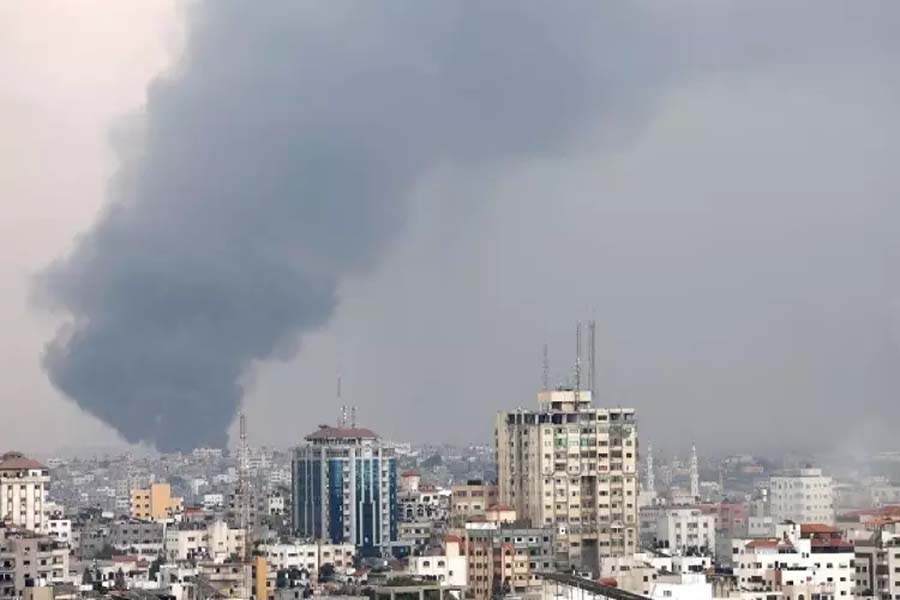
DOHA: Qatari mediators have held urgent calls to try to negotiate freedom for Israeli women and children seized by the militant group and held in Gaza in exchange for the release of 36 Palestinian women and children from Israel’s prisons, a source briefed on the talks told Reuters.
Qatar’s foreign ministry confirmed to Reuters its involvement in mediation talks with Hamas and Israeli officials, including over a possible prisoner swap.
The ongoing negotiations, which Qatar has been conducting in coordination with the United States since Saturday night, are “moving positively” said the source, who has been briefed on them.
“We are in constant contact with all sides at the moment. Our priorities are to end the bloodshed, release the prisoners and make sure the conflict is contained with no regional spillover,” foreign ministry spokesperson Majed Al-Ansari told Reuters, without elaborating.
When asked to respond to the Reuters report, an Israeli official told Reuters only: “There are no negotiations under way.”
But there are no signs of breakthroughs as both sides dig in.
Qatar has been in touch with Hamas officials in Doha and Gaza, the source said, after the Islamist group assaulted Israel from Gaza on Saturday, storming into towns, killing more than 700 Israelis, and escaping with dozens of hostages.
More than 500 Palestinians have been killed by Israeli strikes on Gaza.
The exact number of Israeli women and children hostages Hamas is offering in the potential exchange of 36 Palestinian women and children prisoners the Islamist group identified is not clear, the source said.
Details about negotiations focusing on the release of 36 Palestinians from Israeli jails have not previously been reported.
The number of Israeli hostages held in Gaza also remains unclear, but it is widely believed that Hamas seized women, children, elderly people and soldiers on Saturday.
A Palestinian official, familiar with mediation efforts with Hamas and Israel in the past, told Reuters that Qatar and Egypt have been in contact with the group but the intensity of the fighting cast shadows over any potential breakthrough.
In Hamas-controlled Gaza, Israel has carried out its most intensive retaliatory strikes ever, killing more than 500 people since Saturday. Defence Minister Yoav Gallant said Israel’s blockade would be tightened to prevent food and fuel from being brought into the strip, home to 2.3 million people.
Egypt has been in close contact with Israel and Hamas to try to prevent further escalation in fighting between them and to ensure the protection of the Israeli hostages, two Egyptian security sources said.
Egypt had urged Israel to exercise restraint and Hamas to hold its captives in good condition to keep open the possibility of de-escalation soon, although Israeli strikes on the Gaza Strip made mediation difficult, the Egyptian sources said, speaking on condition of anonymity.
The source who had been briefed on the Qatar-led talks, also speaking on condition of anonymity, told Reuters: “There has been no agreement on logistics or a mechanism for the release.”
Asked about Washington’s coordination with Qatar on a potential swap, the U.S. State Department referenced a Saturday phone call between Secretary of State Antony Blinken and Qatar’s Prime Minister in which the two agreed to “remain closely coordinated”.
There was no response to a request for comment sent to Hamas. Israel’s prime minister’s office said it did not wish to comment.
Eran Lerman, a former Israeli deputy national security adviser, said no Israeli would concede to conditions of the hostage takers, citing the brutality of the attack.
“We should have to see how long they are going to hold the hostages when over the next few days there is no water, no electricity, no food, no medicine for the entire Gaza population”.
Israelis are reeling from the assault and by images of captured fellow citizens being bundled into Gaza. Israel has said it will act to free the hostages, adhering to a longstanding principle of leaving no prisoner behind.
However, Prime Minister Benjamin Netanyahu’s options for hitting Hamas over its incursion into Israel could be reined in by concern for the many Israelis seized in the raid, as a nation scarred by past hostage crises faces perhaps its worst one yet.
Qatar, a tiny but wealthy energy and investment powerhouse that holds ambitious foreign policy goals, has a direct line of communication with Hamas. Qatari envoys have previously helped mediate truces between the Islamist group and Israel.
Doha has recently been under the global diplomacy spotlight, after hosting more than a year of talks between the United States and Iran, which led to prisoner exchanges and fund releases.
While Hamas’ power base is in Gaza, some leaders are based in Qatar as well as other Middle Eastern countries.
















